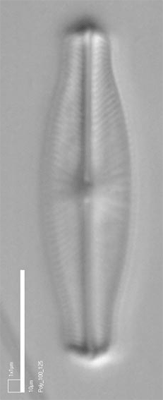 |
images of type specimens
If so, then perhaps our 'focusable' images of type specimens may be helpful. They form a virtual type collection. In it you can look at type specimens almost as though you were looking down a microscope. By sliding a focus button or running a short video sequence, you can focus up and down through the specimens to see the details that interest you – far more than can be seen in a single photograph. The taxa below (scroll down past the picture) are grouped according to the paper in which they appeared. Follow the links to see the types. As time permits, we will gradually complete the set: at the moment there are only a few (from Droop 1998 and Mann et al. 2004 and Harper et al. 2009). Papers for which we have not yet illustrated the types are in square brackets. Follow this link for technical information about this part of the site. |
[Mann D.G. (1981). A new species of sigmoid Nitzschia (Bacillariophyta). Israel Journal of Botany 30: 1-10.
-
Nitzschia paeneperpetua D.G. Mann, sp.nov.]
[Mann D.G. (1990). Evidence from sexual reproduction and protoplast structure concerning the relationships of the heterovalvar diatom Campylopyxis. In M. Ricard (ed.) Ouvrage dédié à la Mémoire du Professeur Henry Germain, 169-179. Koeltz Scientific Publications, Koenigstein.
-
Campylopyxis germainii D.G. Mann, sp.nov.]
[Droop S.J.M. (1996). The identity of Diploneis splendida (Bacillariophyta) and some related species. Phycologia 35: 404-420. (See also Droop S.J.M. (1996). Research note: Correction: Diploneis splendida is an illegitimate name. Diatom Research 11: 381-382.)
- Navicula splendida Gregory
- Navicula bomboides Schmidt
- Navicula gregorii O'Meara
- Diploneis rex S.J.M. Droop, sp.nov.
- Navicula splendida var. heemskerkiana Brockmann]
[Mann D.G. & Stickle, A.J. (1997). Sporadic evolution of dorsiventrality in raphid diatoms, with special reference to Lyrella amphoroides sp. nov. Nova Hedwigia 65: 59-77.
-
Lyrella amphoroides D.G. Mann, sp.nov.]
Droop S.J.M. (1998). Diploneis sejuncta (Bacillariophyta) and some new species from an ancient lineage. Phycologia 37: 340–356.
- Diploneis sejuncta (Schmidt) Jørgensen (= Navicula sejuncta Schmidt)
- Diploneis praesejuncta S.J.M. Droop, sp.nov.
- Diploneis solea S.J.M. Droop, sp.nov.
- Diploneis pneumatica S.J.M. Droop, sp.nov.
- Diploneis biremiformis S.J.M. Droop, sp.nov.
- Diploneis colae S.J.M. Droop, sp.nov.
[Mann D.G. (1998). Lyrella cassiteridum, a new species of marine epipelic diatom. Nordic Journal of Botany 18: 503-512.
-
Lyrella cassiteridum D.G. Mann, sp.nov.]
[Vyverman W., Sabbe K., Mann D.G., Kilroy C., Vyverman R. Vanhoutte K. and Hodgson D. (1998). Eunophora gen. nov. (Bacillariophyta) from Tasmanian highland lakes: description and comparison with Eunotia and amphoroid diatoms. European Journal of Phycology 33: 95-111.
-
Eunophora indistincta R. Vyverman & D.G. Mann, sp.nov.]
[Danielidis D.B. and Mann D.G. (2002). The systematics of Seminavis (Bacillariophyta): the lost identities of Amphora angusta, A. ventricosa and A. macilenta. Europ. J. Phycol. 37: 429-448.
- Amphora angusta Gregory
- Amphora ventricosa Gregory
- Amphora macilenta Gregory
- Seminavis arranensis Danielidis & D.G. Mann, sp.nov.
- Seminavis robusta Danielidis & D.G. Mann, sp.nov.
- Seminavis macilenta (Gregory) Danielidis & D.G. Mann, comb.nov.]
Mann D.G., McDonald S.M., Bayer M.M., Droop S.J.M., Chepurnov V.A., Loke R.E., Ciobanu A. and du Buf J.M.H. (2004) The Sellaphora pupula species complex (Bacillariophyceae): morphometric analysis, ultrastructure and mating data provide evidence for five new species. Phycologia. 43: 459-482.
- Navicula pupula Kützing
- Sellaphora pupula (Kützing) Mereschkowsky
- Sellaphora obesa D.G. Mann & M.M. Bayer, sp.nov.
- Sellaphora blackfordensis D.G. Mann & S. Droop, sp.nov.
- Sellaphora capitata D.G. Mann & S.M. McDonald, sp.nov.
- Sellaphora auldreekie D.G. Mann & S.M. McDonald, sp.nov.
- Sellaphora lanceolata D.G. Mann & S. Droop, sp.nov.
Harper, M.A., Mann, D.G. and Patterson, J.E. (2009) Two unusual diatoms from New Zealand: Tabularia variostriata a new species and Eunophora berggrenii. Diatom Research. 24.
- Eunophora berggrenii (Cleve) D.G. Mann, M.A. Harper & Levkov